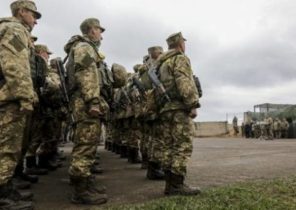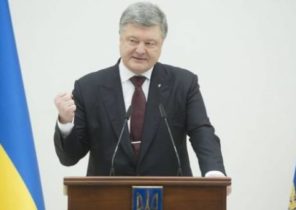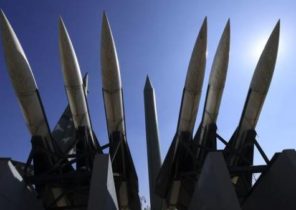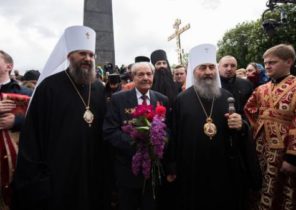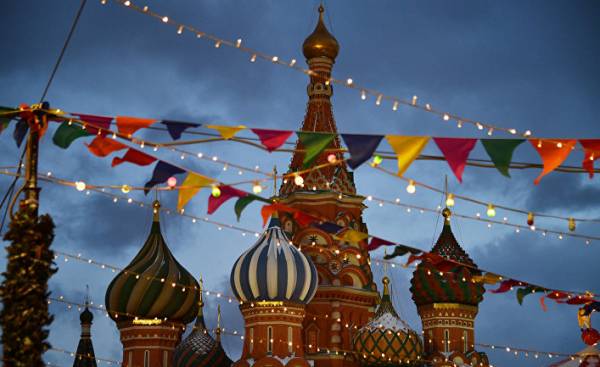
Wiener Zeitung: Professor, how do You assess the relationship between the President and right-wing forces in Europe? For quite some time and there is speculation that the Kremlin seeks the destabilization and chaos in the European Union and is going to achieve it with strache, Le Pen and their ilk.
Gerhard Mangott: first you need to find out how come right-wing populist parties in the EU such proximity to the Kremlin. There are three main factors: an integral component of the policies of right-wing conservative and right-wing populist parties in Europe for many decades has been anti-Americanism. In Russia, these parties see the state that openly opposes American claims to supremacy. Secondly, Russia is an example of a clear, socially conservative public policy that, like a lot of the “right” in Europe. From their point of view, liberal Europe has done with these values.
For example, the Central importance of the family in society and its traditional understanding of marriage, a man and a woman, the importance of religion in society, the government upholding Christian values. The third factor is the sympathy of the right of Europeans to the authoritarian style government in Russia and the role of a strong leader who neglects institutional constraints and dominant in politics.
— What are Russia’s motives for the increasingly explicit appeals to the right?
— Russia supports them because they are in light of these three factors in favour of Russia-friendly foreign policy. In addition, those forces that seek to eliminate the “supranational socialization” in the European Union and increasingly want to move the EU back on the rails intergovernmental cooperation Nations. It is in the interests of Russia, because the Kremlin has always seen its policy in relation to Europe as a policy against States in the Union having the greatest impact. Against Germany, Italy, France and the UK. Russia was never going to review their policy in relation to Europe as a policy dialogue with the EU authorities, and always wanted to give it a bilateral character in the style of policies of major European powers of the nineteenth century.
Any level of refusal of socialization in the interests of a Russian policy towards Europe, striving for bilateral agreements. Therefore, Russian support of the party having concrete chances of participation in the governance of the country or, as in the case with the party of ADH in Germany, a party that is able to reduce the number of voters a powerful Union of the CDU/CSU. A clear goal of Russia is to oust Angela Merkel from the government. And the interests of the “right” Germans are clearly in a weakening of the authority of the Chancellor until her resignation.
Take a look at France. Marine Le Pen often refers to himself as an admirer of Putin and officially called legitimate the annexation of Crimea in 2014. It is extremely important for Russia, especially because she has a good chance to become the first female President of France and she is thinking about Flexite.
Bank that provided the “National front” a loan of € 9 million, managed to go bankrupt. Le Pen was in serious financial difficulty in his campaign, because French banks refused to lend to it. This is unwise, because such parties in the result are forced to become dependent on such creditors.
But Russia does still need Le Pen? Francois Fillon — candidate sympathetic to the Russian President.
— I watched Fillon during his two presentations at conferences with Putin. It really is extremely Russia-friendly stance. After discovered possible embezzlement by the Fillon government funds was not obvious whether he will be in the second round of elections.
— For Putin funding Le Pen is not so important, since he’s in France has a friend in the person of Fillon.
— Marine Le Pen, recognizing the annexation of Crimea, openly voiced a position that is not shared by Fillon. At least not yet. It is also possible that Emmanuel macron will take place in the second round of elections, ahead of Fillon. This option is for the Kremlin, of course, less attractive than the other two. But You are right, in the second round Fillon is likely to win Le Pen and Russian calmly get over it. At the moment, Putin is probably more interested in the fact that in Europe the power came leaders criticizing Russia.
Just as in Germany the Russians want to lower the authority of Merkel, and on their way to victory, Le Pen or Fillon in the elections, the Kremlin is determined to break the German-French relationship in the sanctions policy. This is the main goal of Russian policy towards France.
— Talk a little bit about anti-Americanism. After the President of the United States was Donald trump, acting fully in the interests of Putin, does not lose for the right-wing in Europe this argument is its strength?
— In principle, lose. But a more interesting question is, what will this mean for Russian policy, using the threat of American aggression as a Patriotic means of mobilizing its own citizens? That would mean the easing of tensions between Russia and the United States for this “exculpatory” tool of the Russian government?
— Anti-American attitude of Russians formed and established a few decades ago, is now likely to crumble because of the positive relationships trump to Russia. What that would mean for right-wing forces in Europe?
— If the US and Russia really cooperate for a long time, and if the United States increasingly will turn away from Europe, right-wing forces will not be so easy to keep anti-American attitude. The right wing in Germany was opposed to America mainly because the Americans defeated the Nazis. Other right-wing movements in Europe was anti-American, because he believed that since 1945 Europe has become a vassal of the United States. If trump will act according to the expectations of many, the right will have to refocus on this issue. This is evident by the Austrian freedom party, whose representatives attended the inauguration of the trump.
— Remember the beginning of Putin came to power. Europe missed the chance to working with him in the early 2000s? Then he gave a speech in the German Bundestag, in which they expressed their disappointment in the fact that Europe has rejected Russia’s outstretched hand. Maybe now regret it?
— Hand delivered by Putin the US and the EU in 2000-2001, really was a sincere gesture. Putin then was interested in rapprochement with the West and with the United States and the Europeans. USA too early took steps, rejected this initiative. The Republican Bush administration clearly downplayed the importance of Russia. For Clinton’s relations with Russia played a much more important role. Office, Bush believed that Russia as a powerful state is on the verge of “a great power in decline” (eng. great power in decline), oslableniya and unstable in military and economic terms.
At the same time, this foreign policy that is defined mainly by the neo-conservatives was based on the belief that America is in the system of international relations should seek to liberal hegemony, and arrogance is the so-called unipolar moment (eng. unipolar moment), by definition of Charles Krauthammer, dominated American foreign policy. Russia’s claim to it is considered as equal with great power, and respect its sovereignty and not to interfere in its internal Affairs, did not recognize.
— For example?
— This could include termination of the ABM Treaty signed in 1972 (between the USA and the USSR on the limitation of anti-ballistic missile systems), the second wave of NATO enlargement, the war in Iraq without a mandate from the UN security Council against the will of Russia, rose revolution (Georgia), orange revolution in Ukraine, both of which Russia has felt the compulsion to regime change from the United States. But this list can also include Americans ‘ actions to undermine the energy hegemony of Russia on the territory of the former USSR air defense system in Poland and the Czech Republic, recognition of Kosovo, the invitation of Georgia and Ukraine for membership in NATO. All this has led to strong disappointment, resentment and alienation Putin. So Putin, newly elected to the presidency in 2012, cannot to be compared with the Putin of 2000. Putin’s foreign policy in recent years is based on the belief that the West is constantly deceiving him and passes its interests.
— Often talks about “humiliation of Russia” on the world stage.
— No doubt, feel the ruling elite and a significant part of the population, and this perception is not unfounded. Russia is no longer taken seriously. Russia began to take (eng. rule taker) and not determine (eng. rule maker) the rules of the game.
— Can Russia as a result of severe military actions in Eastern Ukraine or in Syria again to begin to define the rules of the game?
In 2008, Russia conducted a “red line”. After the NATO summit in Bucharest in April 2008, where Ukraine and Georgia were promised membership in NATO, Russia saw this as an infringement of its vital interests. Russia’s intervention in the conflict in Georgia in August 2008, provoked by the Georgian government, was intended to strengthen open territorial conflicts with Abkhazia and South Ossetia, and thereby to prevent the entry of Georgia into NATO. The same way it did with Ukraine in 2014. This is Russia’s response to the intersection she had made the red line, namely at the crossing of the involvement of Ukraine to the West.
— All these actions were and are measures designed to return Russia “to the world map”. The younger generation is again proud of their country, this military power, Putin is viewed as a powerful ruler, to turn Russia into a worthy opponent. And internationally, this image is intensely spread throughout Europe in German, English, Arabic with the help of the Kremlin-backed with millions of subscribers media, such as “Satellite” or “RT”. They publish news in favor of Russia to form anti-Western sentiment and, above all, hostility to the EU.
— Willingness to oppose the liberal hegemony of the United States and to defend their vital interests, demonstrated by Russia, of course, increased the attractiveness of the country for those peoples who consider themselves victims of Western domination. It does not take into account the fact that Russia, in addition to the military sector, and here this applies only to the nuclear sector significantly lags behind the United States. Russia is not suitable for the global perspectives of power. The country has almost no military bases beyond its borders. The nuclear sector is improving and Russia is able to succeed in the military and political arena with its modernized armed forces in the neighboring regions, especially on the background of a power vacuum in the United States. In the economic and technologically Russia is hopelessly behind the United States. Russia’s GDP is $ 1.7 trillion to 18 trillion dollars in the United States.
— It is more about demonstrating power than about the real potential. Even so, often talk about the era of “posttrade” and fake news.
— Russia as “interfering forces” (eng. disturbing power) can destabilize a liberal system, to undermine the policy of the West, upset her in some areas. Russia is not a powerful creative force, a “force that violate the order” (eng. disturbing great power).
— Realistic representation of the chief ideologist of Putin and Alexander Dugin of the Eurasian sample tsarist Russia of the past?
— Russian dominance over the Eurasian continent is possible only with certain restrictions: the Eurasian customs Union, seven years after its Foundation, still operates in full force. Economic Union in practice is not the way it was presented. Before the formation of the domestic market is still very far away. This is also related to the fact that the neighbours of Russia because of the crisis in Ukraine are bringing to the Russia-initiated integration the structure of strict requirements. This Eurasian project from the point of view of Russia, it is very useful in economic and political terms, as well as European integration makes sense for Europeans.
— It seems that right-wing forces in Europe, during the last several years are rapidly gaining momentum, strengthening the power of Russia, in any case, it is necessary for the soul.
— Without a doubt.
— The European Union has made some mistake in relation to Russia?
The European Union wanted to cooperate with Russia. In 1997 signed an agreement on partnership and cooperation. In St. Petersburg in 2003, identified four area of cooperation: economy, internal and external security, research, education and culture. In 2010 was followed by the “Partnership for modernization”. The problem was only that both sides are not too eager to implement their agreement. Putin still less agreed on a large number of conditions in-depth cooperation, namely the requirement of the EU on the formation of legal state and the introduction of democratic institutions. After the action of the partnership agreement in 2007, the parties were unable to negotiate the next agreement. But after the annexation of Crimea, the negotiations on the subject were suspended.
But Putin’s speech in Bundestag, full of frustration with a lack of confidence on the part of Europe, took place shortly after he became President in 2001.
It was the first signs of frustration, but his desire to cooperate still persisted. However, in the Russian government believe the European Union is not an independent player, and politically dependent on the United States. Added to this is the belief that the EU and NATO is hardly different from each other — 22 of the 28 EU members are NATO members, and these alliances are much closer to each other in recent years. So the importance of the EU is estimated too high, and in politics cling to the desire to establish bilateral contacts between the major powers in Europe. 2012 open to talking about different values of the European Union and Russia. Russia rejects liberal values, because they are contrary to Russia’s traditional moral beliefs. Russia criticizes EU for “post-Christian identity” and considers himself the last defender of the Christian way of Europe. This belief is shared and right-wing forces in Europe.
However, those who criticize the support that Russia has a right wing needs to admit that the West for the last 25 years, supported by liberal organizations and parties in Russia, who advocated the establishment of ties with the West. We also should not forget how serious was the interference of the West in the 1996 presidential elections in Russia, designed to ensure the defeat of the Communist candidate, who, incidentally, could win, competing in the elections with Yeltsin. Therefore, it is good to think about how welcome whether interference in the internal Affairs of other countries or is not — in all directions.
— So, the behaviour of the West towards Russia seem hypocritical to You?
Yes.
— And I should add that the concerns of the EU about the support that Russia has a right parties in Europe, comes from the fact that Russia wants to undermine and even destroy the European Union.
— Absolutely. Russia’s intervention comes at a time when the EU faces many difficulties. Aspiring to power right-wing forces were not created by Russia, they represent a phenomenon that emerged in European States in particular and, depending on country-specific, various reasons. Russia uses these parties, gaining a whole lot of power for their own purposes. The assumption that the promotion of right-wing forces is a consequence of the support of Russia, is incorrect.
— Who says something like that?
— This thesis we meet in various interviews; the view that the threat that are right-wing populists, is the result of Russian intervention. Someone wants to neutralize the threat from the right wing needs to turn to the real reasons for their success, and not to the intervention of Russia.
— The Austrian freedom party in December concluded with the party United Russia the agreement on interaction and cooperation. Many have criticized this step. Does it make sense for parties that are not at the government level, to agree on such cooperation? For parties, with a focus on the education of youth in the spirit of “patriotism and love of labor” and creates a very murky impression?
There is nothing unusual in the fact that parties, regardless of whether they are relevant to the government, agree on cooperation. Against the background of Russian dissemination strategies impact on European politics, such an agreement should be considered as an attempt to influence the internal politics of other States. To the question whether the APS to implement the same Patriotic mobilization that it has been several years in Russia is a political goal, should meet in the APS. They must also answer for the fact that the party supporting “patriotism and love of work”, deals with the Soviet formulation. Regarding “patriotism and love of labor”: I was surprised that the United Russia party had clearly addressed this slogan, smack of the Soviet mothballs. I think that APS are not familiar with the historical context and didn’t know what we’re talking about.
— This agreement is rather symbolic?
It certainly represents the efforts undertaken by the Russian state party to cooperate with the Western parties. In light of the Russian strategy to interfere in the internal policy of European States, the Treaty raises questions. If you imagine that United Russia would not gain the favour of Russia if it did not support Putin, the question arises, would make sense cooperation of APS with this party? At the discretion of APS.
— The Ministry of foreign Affairs has not informed anyone about the trip to Moscow, nor about the planned agreement.
— I don’t see this as a problem, parties are not obliged to answer to anyone. What APS not openly stated about his plans, says that they expect them to be criticized.
In 2017, ahead of several elections across Europe. In Germany elections to the Bundestag, in may and presidential elections in France, in Austria it is possible to conduct early elections to the national Council. You see the threat from Russia?
— The likelihood that the Russian intelligence service responsible for a hacker attack during the election race in the US is very high, even if there is evidence available to the public. In 2016, the Russian hackers also attacked the German Bundestag, German ministries, parties and individual politicians. In light of all these alleged actions by Russia to take precautionary measures to prevent these attempts of manipulation. Hacker attacks, of course, practiced in the opposite direction.
— How do You otherwise explain the fact that Russia in this respect are focused on the main characters face?
— Of course, the alleged Russian interference in presidential elections in the United States has reached startling proportions. Therefore holding serious discussions on this topic at all levels is justified. However, the tapping of European politicians conducted by the NSA were not discussed to such an extent. Except that it was mentioned in the media, but at the political level, mainly in Germany, the importance of this subject, strikingly downplayed. Angela Merkel said “Spying among friends is unacceptable”. Politically it is somewhat “flexible”.
— Russia would be discussed in a completely different tone?
— Yes, of course. One does not justify another, but we with great certainty can say that all countries resort to these technical possibilities. In this respect, I do not want to mention the so-called “canaccess”. (Communicative trick of propaganda, popular, mainly in the former Soviet Union and in modern Russia, when the criticism respond response criticism, which by its content could be true, but it aims to disrupt the discussion). I’m not trying to justify inappropriate behavior with another of the same, but only want to demonstrate that such behavior is inherent in all and must cause hostility in equal measure.

